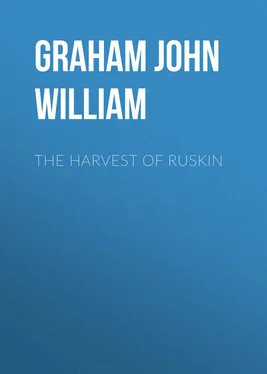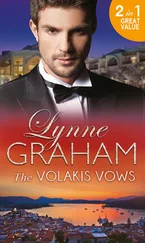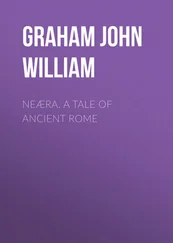John Graham - The Harvest of Ruskin
Здесь есть возможность читать онлайн «John Graham - The Harvest of Ruskin» — ознакомительный отрывок электронной книги совершенно бесплатно, а после прочтения отрывка купить полную версию. В некоторых случаях можно слушать аудио, скачать через торрент в формате fb2 и присутствует краткое содержание. Жанр: literature_19, foreign_antique, foreign_prose, на английском языке. Описание произведения, (предисловие) а так же отзывы посетителей доступны на портале библиотеки ЛибКат.
- Название:The Harvest of Ruskin
- Автор:
- Жанр:
- Год:неизвестен
- ISBN:нет данных
- Рейтинг книги:5 / 5. Голосов: 1
-
Избранное:Добавить в избранное
- Отзывы:
-
Ваша оценка:
- 100
- 1
- 2
- 3
- 4
- 5
The Harvest of Ruskin: краткое содержание, описание и аннотация
Предлагаем к чтению аннотацию, описание, краткое содержание или предисловие (зависит от того, что написал сам автор книги «The Harvest of Ruskin»). Если вы не нашли необходимую информацию о книге — напишите в комментариях, мы постараемся отыскать её.
The Harvest of Ruskin — читать онлайн ознакомительный отрывок
Ниже представлен текст книги, разбитый по страницам. Система сохранения места последней прочитанной страницы, позволяет с удобством читать онлайн бесплатно книгу «The Harvest of Ruskin», без необходимости каждый раз заново искать на чём Вы остановились. Поставьте закладку, и сможете в любой момент перейти на страницу, на которой закончили чтение.
Интервал:
Закладка:
Such is the utmost asceticism of the soul; the most careful and determined assimilation of the least quantity of the bread of life. We may sum his creed in the words: Happy are the pure in heart, for they yet in their flesh shall see the light of Heaven and know the will of God.
Perhaps the question of Divine Personality may be felt even in our most audacious moments to be beyond our analysis. I do not count the word Personality a very helpful one, one way or the other. It is clearly on the human plane, must be imperfect, and may seriously limit our thought of God. Tennyson’s favourite prayer was “O Thou Infinite, Amen.” And with this much of personal address or aspiration our souls may surely rest. Take this as a satisfying account of the Creative Logos of the Greeks, written in the light of evolution, in 1869 ( Queen of the Air , pp. 124-6):
“With respect to all these divisions and powers of plants – it does not matter in the least by what concurrences of circumstance or necessity they may gradually have been developed: the concurrence of circumstance is itself the supreme and inexplicable fact. We always come at last to a formative cause, which directs the circumstance, and mode of meeting it. If you ask an ordinary botanist the reason of the form of a leaf, he will tell you it is ‘a developed tubercle,’ and that ‘its ultimate form is owing to the directions of its vascular threads.’ But what directs its vascular threads? ‘They are seeking for something they want’ he will probably answer. What makes them want that? What made them seek for it thus? Seek for it, in five fibres or in three? Seek for it, in serration, or in sweeping curves? Seek for it, in servile tendrils, or impetuous spray? Seek for it, in woollen wrinkles rough with stings, or in glossy surfaces, green with pure strength, and winterless delight?
“There is no answer. But, the sum of all is, that over the entire surface of the earth and its waters, as influenced by the power of the air under solar light, there is developed a series of changing forms, in clouds, plants and animals, all of which have reference in their action or nature, to the human intelligence that perceives them; and on which, in their aspects of horror and beauty, and their qualities of good and evil, there is engraved a series of myths or words of the forming power, which, according to the true passion and energy of the human race, they have been enabled to read into religion. And this forming power has been by all nations partly confused with the breath of air through which it acts, and partly understood as a creative wisdom, proceeding from the Supreme Deity; but entering into and inspiring all intelligences that work in harmony with Him. And whatever intellectual results may be in modern days obtained by regarding this effluence only as a motion or vibration, every formative human art hitherto, and the best states of human happiness and order, have depended on the apprehension of its mystery (which is certain), and of its personality (which is probable).”
He concludes that lecture, the second in The Queen of the Air , with these words:
“This only we may discern assuredly; this, every true light of science, every mercifully granted power, every wisely restricted thought, teach us more clearly day by day, that in the heaven above, and the earth beneath, there is one continual and omnipotent presence of help, and of peace, for all men who know that they Live, and remember that they Die.”
To quote from the religious teaching of these fruitful years would be an endless task; I must only refer, I fear, without quoting any of it, to The Mystery of Life and its Arts , printed in the complete edition of Sesame and Lilies ; a characteristic and pathetic exhortation, and chiefly perhaps, to § 10-16 of the Introduction to The Crown of Wild Olive .
So much for his constructive teaching. But he was a destroyer too. The peculiarity of his position and the cause of his loneliness was that he was always throwing his darts not only into the camp of the business men and their allies the economists, but also into the two religious camps, generally opposed to one another, held, one by the clergy, the other by the materialistic men of science. He rebuked both parties for their assumptions, and he smote them with all the artillery of sarcasm, wit and indignation. “You have to guard against the fatalest darkness of the two opposite Prides: the Pride of Faith, which imagines that the nature of the Deity can be defined by its convictions; and the Pride of Science, which imagines that the energy of Deity can be explained by its analysis.” 17 17 Lectures on Art , p. 50.
As sword-play it is fine. He gives what purports to be a scientific account of Shakespeare: so much water, so much carbo-hydrate and phosphorus, and thus you build up your organism called William Shakespeare – with, of course, something left out. He was ever dwelling on the realities of the spirit which chemistry omits. The fashionable scientific materialism of the seventies he utterly abhorred: he behaved to it as St. George to the Dragon. He loathed anatomy, mocked at the idea that you understood a creature by cutting up its remains; and when the men of science at Oxford proceeded to vivisection he threw up his professorship in flaming wrath, sick at heart; every sentiment of mercy, every safe doctrine of science violated in unholy cruelty and impatience.
He describes the limitations of “some scientific minds, which in their judgment of the Universe can be compared to nothing so accurately as to the woodworms in the panel of a picture by some great painter, if we may conceive them as tasting with discrimination of the wood, and with repugnance of the colour, and declaring that even this unlooked for and undesirable combination is a normal result of the action of molecular Forces.” 18 18 Lectures on Art , p. 52.
We pass on to the third period of sixteen years, the Mature Period as I call it, from 1874 to 1890, when his productive life ended. He now came to know more fully the fullness of faith. Here he entered into his reward, I say. The revelation of God to him became clearer, sweeter, mightier. As in 1858, the time of crisis was marked by two events which occurred that year, one in things spiritual and one in things artistic. 19 19 See Fors , LXXVI, March 1877, vol. iv. p. 69.
The artistic event of 1874 was a reversal of the puzzling judgment of 1858 to the effect that the worldly painters excelled the devout ones. It came about through his copying one of Giotto’s frescoes on the roof of the Lower Church at Assisi. He was allowed to erect a platform in that dark church over the High Altar, that he might see the picture. There he discovered that Giotto was only beaten by Tintoret in mere science, technique, laws of perspective, composition and light and shade, and that religion had solemnized and developed every faculty of Giotto’s heart and hand. The Franciscan monastery at Assisi is one of the most sacred places on earth anyhow, but 1874 saw one more gift of light there vouchsafed, and a haunting problem solved. Art was to Ruskin a visible manifestation of life’s full faculties, in a department he specially understood; and religion, which is the source of strength and the support of character, he thought should be judged by its output.
Now we turn to the second event. His hopes of the reality of a Spirit world received unexpected and potent confirmation from the fact that in December, 1875, he had, at the house of Lord Mount Temple, at Broadlands, Romsey, some psychic experience so definite that he was convinced that he had true communication with her whom he had lately lost, the “Rosie” of Præterita , No. XXVII. 20 20 See Epilogue.
It was a confirmation to his faith. He became an Honorary Member of the Society for Psychical Research the year after its formation in 1882, joining in that well-grounded hope that a true science of human Personality might be built up by its patient experimental methods. To Lady Mount Temple, née Tollemache, the Egeria of the winter of 1840 in Rome, we owe much for the help she was to Ruskin all through life; and much also that from her came the stimulus to Frederick W. H. Myers and Edmund Gurney to begin the Society for Psychical Research. Two of Ruskin’s stories of Death wraiths may be found in Fors , 21 21 Letter LXIII, vol. vi. p. 89.
also a dream in Letter LXV. He never took to ordinary spiritualism; it is indeed from an attack upon it that he turns to a note describing the happiness of his own experience. “I leave this passage as it was written; though as it passes through the press, it is ordered by Atropos that I should hear a piece of evidence on this matter no less clear as to the present ministry of such powers as that which led Peter out of prison, than all the former, or nearly all the former, evidence examined by me was of the presence of the legion which ruled among the tombs of Gennesaret.” 22 22 Fors , Letter LXI, p. 7, note.
He allows the contradiction to stand; indeed, in this puzzling and partially known subject, a consistent position is beyond the knowledge of most. He returns to the attack on Spiritualism, however, in his 1883 note to the second volume of Modern Painters , p. 244.
Интервал:
Закладка:
Похожие книги на «The Harvest of Ruskin»
Представляем Вашему вниманию похожие книги на «The Harvest of Ruskin» списком для выбора. Мы отобрали схожую по названию и смыслу литературу в надежде предоставить читателям больше вариантов отыскать новые, интересные, ещё непрочитанные произведения.
Обсуждение, отзывы о книге «The Harvest of Ruskin» и просто собственные мнения читателей. Оставьте ваши комментарии, напишите, что Вы думаете о произведении, его смысле или главных героях. Укажите что конкретно понравилось, а что нет, и почему Вы так считаете.












